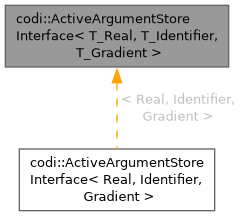Interface for restored data for an argument. The functions should return a compatible type that can be forwarded to the primal evaluation and the gradient computation. More...
#include <activeArgumentStoreTraits.hpp>

Public Types | |
| using | Gradient = T_Gradient |
| See ActiveArgumentStoreInterface. | |
| using | Identifier = T_Identifier |
| See ActiveArgumentStoreInterface. | |
| using | Real = T_Real |
| See ActiveArgumentStoreInterface. | |
Public Member Functions | |
| virtual Gradient | gradientIn ()=0 |
| Get the input gradients. | |
| virtual Gradient | gradientOut ()=0 |
| Get the output gradients. | |
| virtual Identifier | identifierIn ()=0 |
| Get the input identifiers. | |
| virtual Identifier | identifierOut ()=0 |
| Get the output identifiers. | |
| virtual Real | oldPrimal ()=0 |
| Get old primal values. | |
| virtual Real | primal ()=0 |
| Get the primal values. | |
Interface for restored data for an argument. The functions should return a compatible type that can be forwarded to the primal evaluation and the gradient computation.
For example, a CoDiPack value argument like codi::RealReverse a should use codi::RealReverse::Real as the return type for primal(). An argument like codi::RealReverse* p should use codi::RealReverse::Real* instead.
| T_Real | The computation type of a tape, usually chosen as ActiveType::Real. |
| T_Identifier | The adjoint/tangent identification of a tape, usually chosen as ActiveType::Identifier. |
| T_Gradient | The gradient type of a tape usually defined by ActiveType::Gradient. |